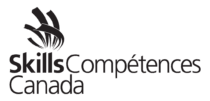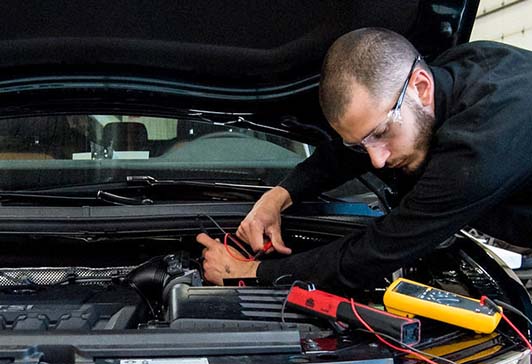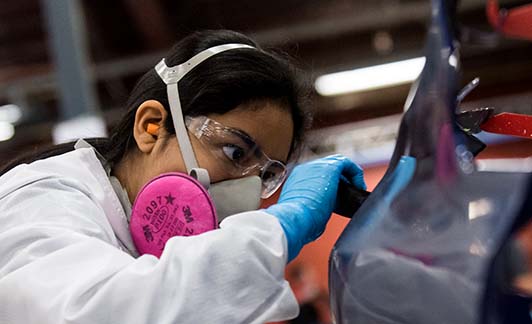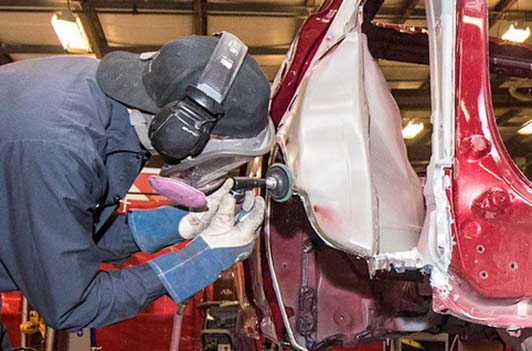Outdoor Power & Recreation Equipment
What is Outdoor Power and Recreational Equipment?
Outdoor Power and Recreational Equipment mechanics carry out diagnosis, make repairs and scheduled maintenance on a large variety of vehicles and small powered equipment including, but not limited to, All Terrain Vehicles (ATV), Motorcycles, Snowmobiles, Generators, Pumps, Lawn Mowers, Lawn Tractors, Small Engine units and other motor vehicles using a large variety of electronic, mechanical testing equipment and tools. With the increasing technical advances currently being made each year, this process involves the use of many computerized diagnostic tools. An even greater variety of tools is used to complete the work depending on the area of expertise you decide to focus on. Besides diagnosis, repairing damaged and defective vehicles and items, mechanics also conduct routine and scheduled maintenance such as engine tune ups, alignment and running gear adjustments, replacement and balancing of tires, replacing the oil and filters, lubrications, engine and handling improvements. Tuning is also required to increase performance and functionality of the varied products. These repairs and maintenance must be completed to exacting safety standards and customer satisfaction.
With all of the high-performance machinery, complex repairs and maintenance necessary, the new technology built into modern outdoor and recreational equipment components, knowledge of electronics is increasingly desirable in a mechanic as this position has developed into a Technician classification through many of these trades.
Mechanics in this unit group perform some or all of the following duties:
- Review work orders and discuss work to be performed with supervisor
- Inspect and test engine and other mechanical components using test devices to diagnose and isolate faults
- Adjust, repair or replace mechanical or electrical system parts and components using hand tools and equipment
- Test and adjust repaired systems for proper performance
- Perform scheduled maintenance service on equipment
- Advise customers on work performed and general condition of equipment
- Determine estimates of repair cost
- May repair and rebuild hoisting mechanism and other mechanical systems on industrial trucks and forklifts.
HOW TO JOIN THE FIELD
Completion of secondary school is usually required.
For motorcycle mechanics, completion of a three- to four-year apprenticeship program or a combination of over three years of work experience in the trade and some high school or college courses in motorcycle repair is usually required to be eligible for trade certification.
Motorcycle mechanic trade certification is compulsory in Ontario and Alberta and available, but voluntary, in Newfoundland and Labrador, Prince Edward Island, Nova Scotia, New Brunswick and British Columbia.
Other mechanics in this unit group may require several years of on-the-job training.
Interprovincial trade certification (Red Seal) is also available for qualified motorcycle mechanics.
INDIGENOUS AND REMOTE CONSIDERATIONS
Many Indigenous and remote communities have mechanical knowledge, particularly when it comes to machines used to hunt. This enables people to fix machines in order to continue traditional hunting and gathering activities that sustain life. However, there may be less access to formal training on mechanical knowledge. Many fly-in communities do not have access to the types of equipment and workplace technology learn the ropes in this career. Students from these communities may need to relocate to get their education and training and may also need to travel to job sites once they get a career. However, mechanical knowledge is a highly desirable skill when it comes to life in remote communities where access to replacement parts and equipment is more limited than in other parts of the country.
Many Indigenous and remote communities do not have the same access to information and experience when it comes to science, mathematics and technology fields. This would likely mean that students from these communities may need extra support when they are pursuing this field both in post secondary school, as well as on-the-job.
In many communities, there would be mechanics needed to fix boats, all-terrain vehicles, snowmobiles, and small equipment so some on-the-job training may be accessed.
DISABILITY CONSIDERATIONS
As this field involves both complex thinking and analysis as well as physical operation, people with physical, intellectual and learning disabilities may need accommodations in order to be successful.
Find the right career path for you with our interactive map!
Trouvez le cheminement de carrière qui vous convient grâce à notre carte interactive!
Sample Job Titles
- All-terrain vehicle repairer
- Forklift mechanic
- Industrial truck repairer
- Motor scooter repairer
- Motorcycle mechanic
- Snowmobile repairer
Companies and Sectors
- Dealerships
- Repair shops
- Service departments
- Self-employed
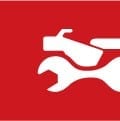
Outdoor Power & Recreation Equipment and the Skills for Success Program
The key Skills for Success for this career path are:
- Reading
- Numeracy
- Problem Solving
